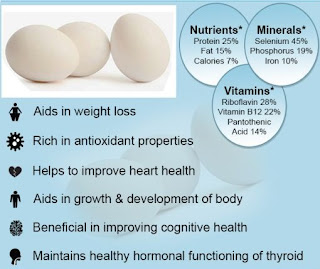Albumen (Egg White)
(Best Quality of Protein Found Ever in Any Food)
Yolk
Benefits of Albumen
- Albumen is an excellent source of protein, with 3.6 g of protein and 17-calorie per egg white which is about 5% of our daily protein needs.
- Albumen is good sources of riboflavin i.e. vitamin B2, which is associated with releasing energy from carbohydrates.
- B2 found in Albumen also helps in metabolism in our body and producing red blood cells. It also works as an antioxidant, breaking down the dangerous free radicals i.e. molecules that can damage/kill cells in our body.
- Selenium found in Albumen helps our body with making special proteins, called antioxidant enzymes, which also plays a role in preventing cell damage.

Benefits of Albumin - Albumen contains 54 milligrams of potassium (a vital mineral and electrolyte associated with heart health, bone health and overall effective cell and organ functioning) and 55 mg of sodium.
- Both potassium and sodium work together to create an essential electrochemical gradient known as membrane potential that is critical for muscle contraction, nerve impulse transmission, heart function, and transferring nutrients and metabolites throughout our cells.
- RVPSL, a peptide found in Albumen inhibits angiotensin-converting enzymes, that are produced by our body and increase blood pressure.
- Albumen is a low-calorie food, it does not contain carbohydrates or sugar. So it plays a positive role in hunger and weight management.
- Albumen contain no saturated fat or cholesterol as yolk has, making them a popular choice for people want to reduce their cholesterol levels or suffering from diabetes or heart disease.
- Ovomucoid named protein found in Albumen is the major egg allergen found till date but can inhibit the growth of tumors, and thus can be used as an anticancer agent.
When & How one can take Albumen?
- Albumen, when one takes in breakfast, he/she gets benefit in blunted postprandial glucose and insulin responses,
- Consumption of Albumen brings greater satiety and lower energy intake at a subsequent meal. So, it is a great option for those suffering from diabetes, high cholesterol or cardiovascular disease.
- The protein of cooked Albumen absorbs well in our body. So its better to take hard boiled eggs.
- Raw Albumen is not recommended for people who may be susceptible to salmonella ( a group of bacteria that causes typhoid fever, food poisoning, gastroenteritis, enteric fever and other illnesses), elderly people and pregnant women.
- Albumen also available in the market in powder form. One can take, only in case of industrialized and fast life.
Adverse things associated with Albumen
- Albumen has been considered the most important source of allergens for some people. Children are the most affected ones for egg allergies and are usually allergic to the proteins in the white. 68% outgrow allergies shows by the age of sixteen.
- Albumens are deficient in Vitamin 'D', which is very essential for healthy bone development.
- Vitamins 'B', 'B12' and iron are found in little amount in Albumen.
- One protein named avidin is an inhibitory substance which helps in binding biotin with it. Due to this, Biotin cannot absorb in the gut, but don't worry my dear friends, it only happens if we take in raw form.

What studies revealed?
- According to the journal ‘Proteome Science’, Albumen is an inexpensive source of high quality protein for food.
- Dr. Mitch Kanter, executive director of the Egg Nutrition Center, the research arm of the American Egg Board, said that, “Eggs are all-natural and provide one of the highest quality proteins of any food available. One whole egg provides more than 6 grams of protein, or 13% of the recommended Daily Value (DV).
- According to a study published in the American Journal of Clinical Nutrition, protein-rich breakfasts in overweight or obese adolescent girls were associated with less evening snacking, as well as positive changes in “appetite, hormonal, and neural signals that control food intake regulation.
- According to a study announced by the American Chemical Society, a peptide called RVPSL (a component of protein) found in Albumens “reduces blood pressure about as much as a low dose of Captopril, a high-blood-pressure drug.”
- According to Toronto dermatologist Dr. Lisa Kellett, applying egg whites to our skin can minimize and reduce the appearance of pores. Also, there are reports that egg whites can produce tighter skin, and improve the overall texture of the skin’s surface.















